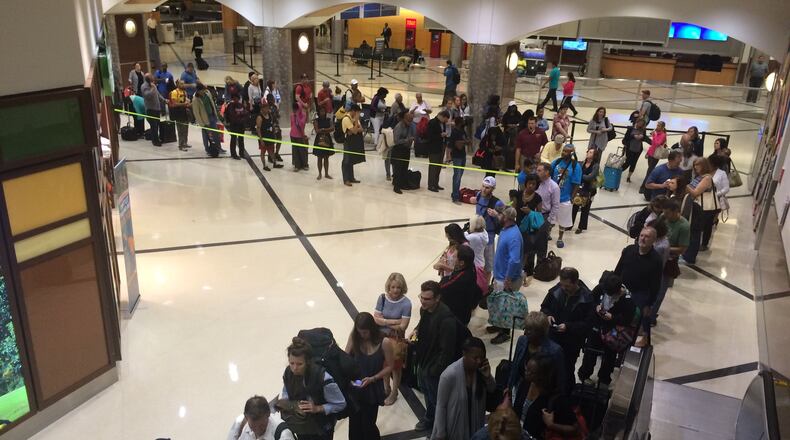During peak travel times, the domestic terminal at Hartsfield-Jackson International Airport is crowded with thousands of travelers packing into long security lines with wait times up to an hour long.
Meanwhile, the international terminal on the other side of the airport remains a sparkling oasis with wide open space and few crowds.
Credit: Kelly Yamanouchi
Credit: Kelly Yamanouchi
What's more, security wait times at the international terminal are often less than 15 minutes long, even when people at the domestic terminal are stuck in hour-long lines.
But airport and Transportation Security Administration officials recommend against using the international terminal for domestic flights just to skip lines.
Credit: Kelly Yamanouchi
Credit: Kelly Yamanouchi
"We're not advising [travelers in the domestic terminal] to go to the international terminal," said Hartsfield-Jackson spokesman Reese McCranie. "We're advising them to stay in line. It will move quickly."
The reason: TSA plans its staffing based on the number of travelers expected through the different checkpoints each hour.
For the international terminal, that's based on the number of international flights. If large volumes of domestic passengers were to unexpectedly head to the international terminal, that could lead to problems for those travelers, according to the airport.
"That's not something we would encourage," McCranie said. "Your line may actually be longer at international."
And lines still form at the international terminal security checkpoint during peak times for international travel, such as in the afternoons when large aircraft departing on overseas red-eye flights can draw hundreds of passengers to the terminal.
"There's only a certain amount of lanes there" at the international terminal, said TSA spokesman Mark Howell. The international terminal's main checkpoint has less than a third of the number of security lanes at the domestic terminal.
"If we start to send folks [to international] that we have projected to fly domestically," Howell said, "it just adds to what we have projected over there."
Still, using the less-crowded international terminal for domestic flights has been a not-so-hidden secret of frequent travelers since the new terminal opened in 2012.
But there are some logistical issues that could cause headaches for travelers who are unfamiliar with how the airport is structured and designed, and for those who are unschooled in the quirks of airline check-in counters and baggage handling.
Among the logistical issues of using the wrong terminal are getting boarding passes, checking and reclaiming bags, and parking.
For one, not every airline has check-in counters at both terminals. Those airlines that do not operate international flights from Atlanta, such as American, United, Frontier and Spirit, do not have check-in counters at the international terminal. Passengers flying domestically who run into this issue would not be able to check bags, or get a boarding pass if they do not already have one.
For passengers who do check bags, if they drive to the international terminal for a domestic flight, they may still run into an issue when they return from their domestic trips and claim their bags at the domestic terminal, then have to catch a shuttle with their baggage to get back to their car at the international terminal.
And, the hourly and park-ride parking garages at the international terminal also do not have the capacity to handle the volumes that the domestic terminal has, according to Hartsfield-Jackson. The international terminal parking garages also do not have daily parking within walking distance -- only hourly parking.
The international terminal also has less-convenient connectivity to some off-airport parking lots and to MARTA.
Could the international terminal someday act as a general second entrance to the world's busiest airport, and become a solution in the future to congestion at the domestic terminal? Airport officials are not keen on the idea of transforming the role of the international terminal into an all-purpose check-in point.
"It is far less efficient to split your workforce," McCranie said. "You wouldn't be able to process a high volume of passengers in a quick and efficient way."
About the Author
Keep Reading
The Latest
Featured





